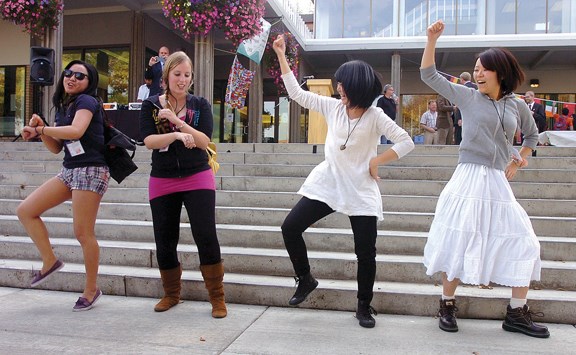Canada, with its history of opening its borders to immigrants, is known as a cultural mosaic, and that welcoming attitude to create diversity also extends into the halls of the city's post-secondary schools.
Hundreds of international students from the College of New Caledonia and UNBC showed their smiling faces Friday afternoon at Veterans Plaza at City Hall at a welcoming barbecue hosted by the City of Prince George.
International student numbers have been climbing steadily at the College of New Caledonia, from 175 in the fall of 2009 and 247 in the 2011 fall semester, to 300 registered this fall -- a 40 per cent increase since 2009.
"We've had some big jumps over the last few because we are recruiting hard," said Barb Old, dean of community and international education at CNC. "India is a big market for us. Two years ago we had none, now we have around 50 Indian students.
"Certainly, CNC offers some good programs and they like Prince George."
International students now make up nine per cent of UNBC's 2,970 student population. In the fall of 2011 there were 332 foreign students -- 254 in undergraduate programs and 78 in graduate studies -- and that number has risen steadily every year since 2005. China sent 131 students to UNBC in the 2011-12 school year, followed by Saudi Arabia (58), the United States (21), India (16), Nigeria (14) and Japan (11).
In northern B.C., international students contribute $24 million annually to the economy and across Canada the dollar impact reaches into the billions. At CNC, international students pay $1,149 for one three-credit course, while the subsidized rate for domestic students is $242 per course. UNBC charges $550.89 per credit hour for international student tuition and $157.40 per credit hour for domestic students.
"A number of our students transfer to UNBC," said Old. "When they first arrive they plan to transfer to one of the main universities they know about -- UBC, UVic, Waterloo and McGill -- but once they're here for a few years, they have their friends, the apartment, their part-time jobs and typically they choose to stay in Prince George."
Each school organizes orientation activities where international students learn about health care, lifestyle changes and cultural adjustments.
"We have an international students' office that's dedicated to all their concerns if they want to drop in and there's all kinds of social networking and events like potluck suppers so they can get to know one another," said said Alyson Gourley-Cramer, UNBC's communications and media relations manager.
"They are also invited to our student life activities we have every week on campus and if they live in residence we have more than one event every week. Those aren't the kegger parties you might think of, they're more educational, like how to grocery-shop, how to cook and how to be independent."
Most international students are placed in homestay housing with host families to help them adjust to the school, city and their new country. One of the selling points of attending classes in Prince George is the city's smaller size, which helps speed the integration process.
"If you want to speak Chinese and eat Chinese food and have Chinese friends, go to Vancouver, don't come to me," said Old. "But if you want a Canadian experience and want to improve your English and live in a small friendly community, then come to me. I think an important part of international students in Prince George is their contribution to the cultural and social dynamic in the community. Without all the Saudi students the college and university brought into Prince George, that mosque [the Prince George Islamic Centre] might not have been built."
CNC and UNBC also promote exchange opportunities for Canadian students to attend foreign countries for studies and practicum placements.



